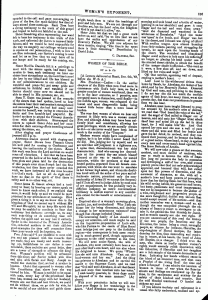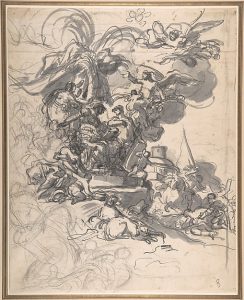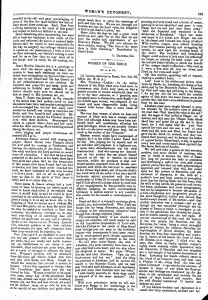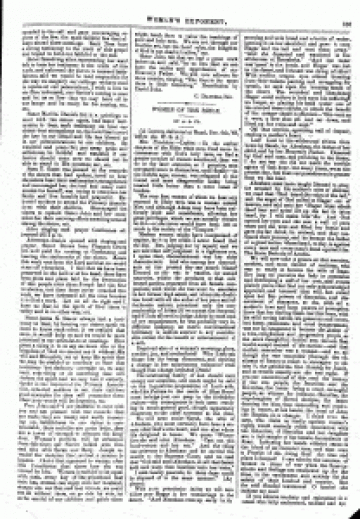This article originally appeared in the Women’s Exponent in February 1890. It is a great summary of many women spoken of in the bible, and gives us some insight into what was being taught in Mormon Women’s meetings in that time period.
Women of the Bible
By A. B. C.’s
[A lecture delivered at Manti, Dec. 6th, ’89, before the W.S. A.]
Mrs. President – Ladies- In the earlier chapters of the Bible when men lived more in consonance with God’ holy laws, we find a greater number of women mentioned, than we do in later centuries, as I perceive, men arrogated more to themselves, until finally – in the middle ages, women, was relegated to the lowest and most disagreeable tasks,- being treated little better than a mere beast of burden.
The very first woman of whom we hear any account in Holy writ was a woman named Eve, and though Adam may have been uniformly kind and considerate, allowing her great privileges, which we are morally certain he did—or she never would have been left so much in the society of the “Temper.”
 Modern women might have complained of neglect, be it to her credit I have never heard that she did. But, judging her by myself, and we are told that self-judgement is a righteous one, I opine that, discontentment was her chief characteristic. And who among her descendants of the present day can blame her? Doomed as she was to wander, for untold centuries, within the precincts of that celebrated garden, separated from all female companions, and whom she was wont to associate in her former high estate and whom she doubtless loved with all her adore of her pure and affectionate nature, permitted only the companionship of Adam (if we except the serpent), and if I am allowed to judge Adam by most men of my acquaintance, he was probably very indifferent company, as men’s conversational brilliancy is seldom exerted to any considerable extent for the benefit or entertainment of a wife.
Modern women might have complained of neglect, be it to her credit I have never heard that she did. But, judging her by myself, and we are told that self-judgement is a righteous one, I opine that, discontentment was her chief characteristic. And who among her descendants of the present day can blame her? Doomed as she was to wander, for untold centuries, within the precincts of that celebrated garden, separated from all female companions, and whom she was wont to associate in her former high estate and whom she doubtless loved with all her adore of her pure and affectionate nature, permitted only the companionship of Adam (if we except the serpent), and if I am allowed to judge Adam by most men of my acquaintance, he was probably very indifferent company, as men’s conversational brilliancy is seldom exerted to any considerable extent for the benefit or entertainment of a wife.
Deprived also of a woman’s crowning glory, comfort, joy and motherhood! Who I ask can blame her for being discontent, and desiring a change in her monotonous existence? Even though that change included death!
The interesting family of Lot should next occupy out attention, and much might be said on the inquisitive propensities of Lot’s wife, who like Fatima in the castle of Blue Beard must indulge just one peep in the forbidden regions- the consequence in both cases resulting in much general good, though apparently, disastrous to the chief actresses of the time.
We will next notice Sarah, the wife of Abraham who must certainly have been a woman after God’s own heart and one whom He delighted to honor. We quote, “Wherefore she said unto Abraham, Cast out the bond woman and her son.” And the thing was grievous to Abraham and he carried the matter to the Supreme Court and we read that “God said unto Abraham, in all that Sarah hath said unto thee hearken unto her voice.”
I wish family quarrels, in these days, be disposed of in the same manner.” [Applause]
With your permission ladies, we will now fallow poor Hagar in her wanderings in the desert. “And Abraham rose up early in the morning and took bread and a bottle of water (putting it on her shoulder) and gave it unto Hagar and the lad and sent them away.” “And she departed and wandered in the wilderness of Bathsheba.” “And the water was ‘spent’ in the bottle, and Hagar was lost in the desert and Ishmael was dying of thirst. With a swollen tongue, eyes almost bursting form their sockets, panting and struggling for breath, he sank upon the burning sands of the desert. The wretched and abandoned Hagar could endure to look upon his sufferings no longer, so placing his head under one of the stunted desert shrubs, to obtain the benefit of the meagre shade it afforded- “She went as it were, a bow shut off, and lifted her voice and wept.”
Oh! That terrible, agonizing wall of despair, rending a mother’s heart.
Lost! Lost in the wilderness, driven from home by Sarah, by Abraham, the father of her child, and by her Heavenly Father. Deserted by God and man, and perishing in the desert. I do not say that she did not merit the terrible agony of that hour, but many times, we at the present day feel our punishment is greater than we can bear.
Abraham must have taught Ishmael to pray, for aroused by his mother’s cries of distress, we heard that “God heard the voice of the lad,” and the angel of God called to Hagar out of heaven and said unto her, Hagar, what aileth thee? Fear not! Arise lift up the lad in thine hand, for I will make him.” And God opened her eyes and she saw a well of pure water and she went and filled her bottle and gave the lad drink, he revived, and they continued their journey and he became the father of a great nation whose hand, to-day, is against every man, and every man’s hand against him. The fierce Bedouin of Arabia.
We will now take a look at the sweetest meekest, most dutiful of maidens, who was so ready to become the wife of Isaac. Ere long we see the lady in possession and development of a will of her won, and events plainly prove that God not only acknowledged, approved and honoured that will, but relied on her fine powers of discretion, and discernment of character, as she, with all a mother’s love and keen powers of perception knew that her darling Esau, her firstborn, with his wild roving habits, his generous and brave, but hasty passionate and cruel temperament, was not competent to become the father of a wise, enlightened and progressive people, as the more thoughtful dutiful son; the con that would accept counsel of his mother—and that mother remember was a woman—and so, although she was compelled (through the obstinacy of Isaac) to resort to stratagem to obtain it, she gained the first blessing for Jacob, and as women usually are, she was right. If you are unconvinced of this, read the history of the two people, The Israelites and the Edomites, the latter being cruel, revengeful people, as witness for instance, Herodias, the step daughter of Herod Antipus, the latter dancing for him and receiving in turn, at his hands, the head of John the Baptist on a charger. I think even the men, who claim so loudly against women’s rights, would scarcely relish association with the Edomites, if Herodias and her daughters are a fair example of the female descendants of Esan. Imbuing her hands without cause in the blood of an innocent man, and that man a Prophet of the living God! The time and place a banquet! can admire the heroism of women in times of war when the finer instincts and feels are swallowed up for the time, in the excitement and anxiety for the safety of their kindred and country. But the cold blooded- murderers! O horror! She sickens my soul.
If you admire modesty and refinement in a woman who is fully understood, realised and appreciated all her rights, turn with me to the inspired prophetess who dealt “under a palm tree between Ramak and Bethel in Mount Ephraim and judged Israel at that time, and the children of Israel came up to her for judgement.”

When the country was invaded by Jabin’s army under command of that successful and skilful general, the famous Sisera, she sent for Barak, to take command of the hosts of Israel. But the faint-hearted Barak said unto her, “If thou wilt go with me, I will go, but if thou will not go with me, I will not go.” She answered, “I will surely go with thee, notwithstanding the journey thou takest shall not be for thine honor, for the Lord shall sell Sisera into the hands of a woman. And Barak went up with ten thousand men at his feet, and Deborah went up with him. Then we read the description of a terrible battle and the entire route of Sisera’s army, and how Sisera in attempting to make good his escape on foot, fell into the tender mercies of a woman who could perform deed of valour for the liberties of the nation if not for her own individual rights. We read, “Howbeit Sisera fled away on his feet and came to the tent of Jael the wife of Heber the Kenite.” And Jael went out to meet Sisera and said unto him, “Turn in my lord turn into me, fear not,” and he after many warnings of precaution went into the tent and she “covered him with a mantel.” Then when he had “fallen asleep from weariness,” Jael, Heber’s wife took a nail from the tent, and took a hammer in her hand and went softly into him, and smote the nail into his temple and fastened it to the ground.” Then follows the sweet song of Deborah, which for vividness of description is unsurpassed, permit me to recommend it for your careful perusal, ladies; I will quote a few sentences the sentiment of which my heart echoes. “The Inhabitants of the villages ceased, the ceased in Israel unto I, Deborah arose I arose a mother in Israel. My heart is toward the governors of Israel, that offered themselves willingly among the people, bless ye the Lord blessed above all women shall Jael the wife of Heber the Kenite be; blessed shall she be above women in the tent. He asked for water and she gave him milk, she brought forth butter in a lordly dish.”
“She smote off his head when she had pierced and stricken through his temples.”
We also find in Holy writ , a most forcible and brilliant example of what women can do, towards securing and maintaining their “equal rights” with man, the undaunted and courageous manner in which the five daughters of Zelophabad stood by the door of the Tabernacle before Moses Eleazer, the princes and all the congregation, demanding their rights of inheritance; saying, “our father died in the wilderness; and he was not in the commonly of Korah, that gathered themselves together against the Lord, but died and had no sons. Why should the name of our father be done away from among his family because he had no sons? “Give unto us, therefore a possession among the brethren of our father!”
This importunate demand appears to somewhat discomforted the great Israelitish law-giver; he was complete nonplussed by a family of young and beautiful, but determined and dauntless daughters Moses knew not what to do until, as the goof book tells us, “He brought the cause before the Lord.”
“And the Lord spoke unto Moses, saying the daughters of Zelophahad, speak right. And commanded an inheritance be given them, thus a precedent was established which was afterward regarded as a law in Israel.
Now I venture to assert if Mulah, Hogleh, Noah, Milcah and Tirzah had lived in those days, and had dared to assert their claims before Moses, Eleazer, the princes and all the congregation before the door of the Tabernacle; men would have sneered and said, “attend to household duties,” “strong minded,” “clamouring for their rights” “unsexing themselves,” “out of sphere “ & etc.
“Women ‘sphere’ is bounded only
By the talents God had given,
And her duty lies wherever
Earth can be made more like heaven.”
Now Mrs. President and Ladies we do not lack material for lectures so long as there still remains in the Bible unmentioned by us such characters as Miriam, Ruth, Naomi, Vashti, Esther, Susannah, Judith, and the woman who was the mother of seven sons, with hosts of others both in the Old and New Testaments.
-Adella B. Cox Sidwell






2 Responses
I’m laughing so hard I’m crying. This is the BEST. So many great moments. Eve would rather DIE than spend one more tedious day stuck alone with Adam in the garden, and who can blame her?! LOL! “God said unto Abraham, in all that Sarah hath said unto thee hearken unto her voice.” I wish family quarrels, in these days, be disposed of in the same manner.” [Applause]” BAAAHAHAHAHA Rebekah was forced by Isaac’s “obstinacy” to use stratagem, and “as women usually are, she was right.” Oh my goodness. Priceless. [wipes tear]
I know!! I *loved* *loved* *loved* this!!